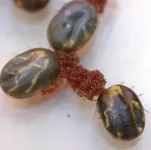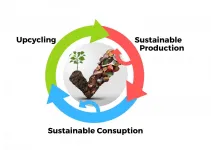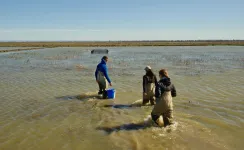Coronavirus was brought into Russia at least 67 times
2021-01-28
(Press-News.org) A research team from HSE University and SkolTech, together with experts from the Smorodintsev Research Institute of Influenza in St. Petersburg and the RAS Kharkevich Institute for Information Transmission Problems (IITP), discovered that the SARS-CoV-2 virus independently entered Russia at least 67 times, mostly at the end of February and beginning of March 2020. The vast majority of introductions came from European countries. No cases of introduction from China were registered, which is likely due to the timely closure of borders with the country. Currently, nine local virus lineages are circulating in Russia, which are not present elsewhere in the world. Given that Russia was actively 'importing' the virus from abroad, the researchers have not detected any cases of 'exporting' any SARS-CoV-2 lineages in other countries.
The article 'Genomic epidemiology of the early stages of the SARS-CoV-2 outbreak in Russia' was published in Nature Communications.
To analyse and build phylogenetic trees, the researchers used 211 virus genomes, which were sequenced at Smorodintsev Research Institute of Influenza. All the genomes had been obtained from patients from 25 Russian regions (including the Republic of Crimea) during the period from March 11 to April 23, 2020. The resulting dataset reflected the situation at the early stages of the epidemic in Russia.
In addition, to establish the full scope of phylogenetic links, the scholars used a dataset of 19,623 SARS-CoV-2 genomes from the rest of the world available on May 26, 2020. The analysis also extensively used data about people's transit across Russian borders and inside the country.
The phylogenetic trees built by the researchers demonstrated that in the early stages of the epidemic, almost all lineages of SARS-CoV-2 that evolved by that time circulated in Russia. Meanwhile, a vast majority of genomes belonged to the lineages prevailing in Europe. It turned out that only 2% of them were Asian ones, while they comprised about 50% of the lineages in China at the moment. This means that the main channel of coronavirus 'import' was the passenger traffic from European countries. Probably, the Chinese lineages also came from Europe, since the borders with China had already been closed long before that.
The researchers believe that such a high diversity of the virus was achieved due to at least 67 independent virus introductions in different Russian cities in the end of February - beginning of March. Out of these, nine introductions led to the appearance of local virus lineages, which circulate only in Russia.
'The study demonstrates a way to objectively investigate the paths and character of a virus spreading in a population. Today is a unique situation for researchers: we are getting data, including genomic data, almost in real time. 'Thanks' to the pandemic, we are learning a lot about epidemics more broadly, which will help in predicting and controlling them in future,' says Vladimir Shchur, Head of International Laboratory of Statistical and Computational Genomics
One of the most interesting results is that the virus that launched the epidemic appeared in Russia quite late. Most of the people who brought the novel coronavirus to Russia arrived in late February - early March. There were no traces of earlier evolution of specific lineages in the country.
SARS-CoV-2 came to Russia to stay. There are no signs of 'exporting' the Russian variations of the virus abroad (at least to the countries with data available). This sets the country apart from such global super-spreaders as Italy and Spain, which laid the foundation for the European epidemic, or Great Britain. Inside Russia, the virus started spreading almost immediately after it was imported. The first in-Russia transmission happened as early as March 11.
The researchers paid particular attention at the virus outbreak at one of non-infectious hospitals in St. Petersburg - the Vreden Hospital, where over 700 people were locked down in a quarantine for a month, and over 400 of them were infected. According to the city governor Alexander Beglov, the virus was brought there by an employee who came back from a vacation in Turkey. However, the analysis of several dozen genomes from the institution demonstrated that the virus was introduced there from two to three times. And each time, this led to a specific outbreak, which merged and looked like one big outbreak.
The specific features of the Vreden Hospital case - its isolated community - make it look like the notorious infection at Diamond Princess cruise ship in the beginning of the pandemic. Such closed populations really get infected by one introduction. There had been no reason to believe that the situation in St. Petersburg was different. And only genome analysis helped reveal the real dynamics of infection in the hospital, with multiple repeated virus introductions.
Genomic epidemiology is only able to dispel the rumours and myths about the 'early epidemic' in Russia in November 2019 - January 2020, which are persistently discussed on social media. It also demonstrates the effectiveness of the state restrictive policies. For example, the timely closure of borders with China did not allow the novel coronavirus to be introduced from there into Russia in January and February 2020.
At the same time, the measures to control passenger traffic from Europe and other countries in February and March 2020 turned out to be insufficient. This is where SARS-CoV-2 came from, which provoked several local outbreaks that led to a full-scale epidemic.
In addition, genomic epidemiology is a good practical tool for epidemiologists, doctors and developers of vaccines. The more time that passes since the beginning of the pandemic, the more there are sequenced genomes of viruses from all parts of the planet. Different lineages will depart further, which will help us understand the general evolutionary vector of SARS-CoV-2, how it adapts to humanity and whether it demonstrates the signs of attenuation (decreasing the harmful effect on the human body and virulence).
INFORMATION:
Once the paper is published, the paper will be available to view online at http://www.nature.com/ncomms. EMBARGOED until 28 January 2021, 05:00 US Eastern time / 10:00 London time (GMT)
ELSE PRESS RELEASES FROM THIS DATE:
2021-01-28
ROCHESTER, Minn. -- In a new study published in Circulation, Mayo Clinic researchers provide the first preclinical, proof-of-concept study for hybrid gene therapy in long QT syndrome, a potentially lethal heart rhythm condition.
Researchers demonstrated its potential therapeutic efficacy in two in vitro model systems using beating heart cells reengineered from the blood samples of patients with 1 long QT syndrome. They targeted the whole KCNQ1 gene rather than specific LQT1-causative mutations, making this study applicable to all patients with long QT ...
2021-01-28
When you think of fungi, what comes to mind may be a crucial ingredient in a recipe or their amazing ability to break down dead organic matter into vital nutrients. But new research by Shuhai Xiao, a professor of geosciences with the Virginia Tech College of Science, and Tian Gan, a visiting Ph.D. student in the Xiao lab, highlights yet another important role that fungi have played throughout the Earth's history: helping the planet recover from an ice age.
A team of scientists from Virginia Tech, the Chinese Academy of Sciences, Guizhou Education University, and University of Cincinnati has discovered the remains of a fungi-like microfossil that ...
2021-01-28
A tick saliva study reveals immune responses that could lead to better protection for cattle.
Scientists from Hokkaido University, Japan and Universidade Federal do Rio Grande do Sul and Universidade Federal do Rio de Janeiro, Brazil, have revealed that substances in tick saliva activates immune response-suppressing proteins in cattle that facilitates the transmission of tick-borne diseases. The finding was published in the journal Scientific Reports and could help in the development of alternative control strategies.
The Asian blue tick, Rhipicephalus microplus, feeds on cattle, causing skin lesions, ...
2021-01-28
There's a better end for used food than taking up space in landfills and contributing to global warming.
UC Riverside scientists have discovered fermented food waste can boost bacteria that increase crop growth, making plants more resistant to pathogens and reducing carbon emissions from farming.
"Beneficial microbes increased dramatically when we added fermented food waste to plant growing systems," said UCR microbiologist Deborah Pagliaccia, who led the research. "When there are enough of these good bacteria, they produce antimicrobial compounds and metabolites that help plants grow better and faster."
Since the plants in this experiment were grown in a greenhouse, the benefits of the waste ...
2021-01-28
Earth is warming rapidly, but there is too little observational data in some regions such as the Arctic or high-altitude areas like the Qinghai-Tibetan plateau to adequately and consistently assess temperature variations across the globe. To better understand how temperatures have increased, an international team led by researchers at Sun Yat-Sen University in China has released a newly merged global surface temperature dataset, including reconstructed land and marine measurements from the 1850s to 2018. The study provides evidence that there was a consistent increased warming trend compared with previous estimations, which closely matches the available observational data and updated simulations covering the past two decades.
The approach ...
2021-01-28
A new paper in the Review of Economic Studies, published by Oxford University Press, finds that a generous parental leave policy nurses enjoyed in Denmark caused nursing shortages, which resulted in a decline in the quality of hospital and nursing home care. The study estimates a large increase in nursing home mortality.
Beginning in 1994 a parental-leave program in Denmark offered any parent the opportunity to take up to a full year off work, paid, for every child under the age of nine. The researchers find that many nurses in Denmark took advantage of this program. Nurses, however, could not be replaced on net despite the Danish government's efforts to expand education and immigration ...
2021-01-28
If you look deep into the eyes of a fish, it will tell you its life story.
Scientists from the University of California, Davis, demonstrate that they can use stable isotopic analysis of the eye lenses of freshwater fish -- including threatened and endangered salmon -- to reveal a fish's life history and what it ate along the way.
They conducted their study, published today in the journal Methods in Ecology and Evolution, through field-based experiments in California's Central Valley. The study carries implications for managing floodplains, fish and natural resources; prioritizing habitat restoration efforts; and understanding how landscape disturbances impact fish.
The technique had previously been used in marine environments, ...
2021-01-28
Worldwide, over one billion people live with a disability. Historically, they have been discriminated against and stigmatized by society. To improve their rights, they should be included in political decision-making, yet there is a lack of political representatives who are known to have a disability. This under-representation may be due to several factors, including how voters perceive a political candidate with a disability. However, a new study published in Frontiers in Political Science, found for the first time that voters do not apply negative stereotypes when evaluating candidates with a disability. Rather, voters tend to perceive candidates with a disability as capable, ...
2021-01-28
Prescription drug prices in the United States are significantly higher than in other nations, with prices in the U.S. averaging 2.56 times those seen in 32 other nations, according to a new RAND Corporation report.
The gap between prices in the U.S. and other countries is even larger for brand-named drugs, with U.S. prices averaging 3.44 times those in comparison nations.
The RAND study found that prices for unbranded generic drugs -- which account for 84% of drugs sold in the U.S. by volume but only 12% of U.S. spending -- are slightly lower in the U.S. than in most other nations.
"Brand-name drugs are the primary driver of the higher prescription drug prices in the U.S.," said Andrew Mulcahy, lead author of the study and a senior health policy researcher at RAND, a ...
2021-01-28
SINGAPORE, 28 January 2021 - One in three adults, particularly women, younger adults, and those of lower socioeconomic status, are experiencing psychological distress related to COVID-19, researchers at Duke-NUS Medical School, Singapore, reported in the journal PLOS ONE.
COVID-19 continues to pose serious threats to public health across the globe, and interventions such as lockdowns, quarantine and social distancing are having an adverse impact on the mental well-being of populations. The pandemic has escalated the burden of psychological distress, including anxiety, depression, post-traumatic stress and insomnia. However, the factors associated with increased susceptibility to psychological distress among adults in the general population during COVID-19 ...
LAST 30 PRESS RELEASES:
[Press-News.org] Coronavirus was brought into Russia at least 67 times




